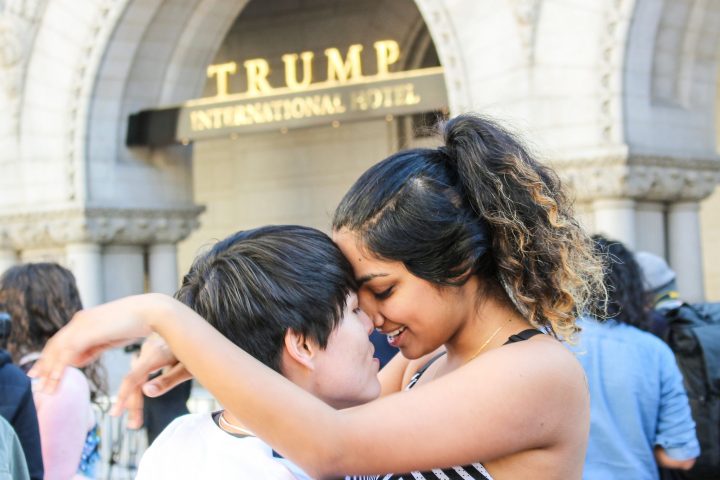By David Breitkopf
Donald Trump’s progressive record in office is—let’s just say—wanting. But his supporters are quick to point out his support of the LGBTQ community as one instance where he has come down on the right (or left) side of the ledger.
It is true that during the 2016 campaign, Trump came out in opposition to the controversial North Carolina law that required transgender people to us bathrooms that match the sex indicated on their birth certificate. And in an unprecedented pronouncement for a Republican candidate, Trump came out firmly for Gay rights during his GOP convention speech.
But what did Trump actually say during that otherwise grim speech? A YouTube search returns us to that epic moment: After reading off a teleprompter a litany of terrorist attacks in the United States starting with 9/11, he noted that “only a few weeks ago in Orlando, Florida 49 wonderful Americans were savagely murdered by an Islamic Terrorist. This time the terrorists target: LGBTQ community. No good. And we’re going to stop it.” That was the Pulse nightclub massacre, in which an American-born man of Afghan decent went on a rampage in retaliation apparently for American intervention in Iraq and Syria.
Trump then made his big promise: “As your president, I will do everything in my power to protect our LGBTQ citizens from the violence and oppression of a hateful foreign ideology.” The crowd roared its approval.
Yes, Trump explicitly promised to protect the LGBTQ community from a foreign ideology. There is nothing in that speech about protecting the community domestically. On that front, the Trump Administration has been abysmal, frequently subjecting the LGBTQ community to its oppressive and hateful ideology.
From the beginning of Trump’s tenure, his administration has shaved off numerous rights of the LGBTQ community on an almost monthly basis.
Just one month in, Trump’s Departments of Justice and Education withdrew its landmark 2016 guidance explaining how schools must protect transgender students under the federal Title IX law—based on the very same North Carolina law Trump had come out against during the campaign. A few months later the Justice Department under Attorney General Jeff Sessions completed the bait and switch, withdrawing its lawsuit challenging North Carolina’s anti-transgender law.
This month, on the fiftieth anniversary of the Stonewall Riots, the Trump Administration parsimoniously denied requests by various U.S. Embassies to fly the Rainbow Flag in support of the LGBTQ community—a wholly symbolic gesture. But many of the administration’s anti-LGBTQ actions have had real and negative consequences for gay and transgender people.
This past May alone, The Department of Health and Human Services published a final rule permitting hospital officials, staff, and insurance companies to deny care to patients, including transgender patients, based on the health provider’s religious or moral beliefs.
The Department of Housing and Urban Development (HUD) announced a plan to gut regulations prohibiting discrimination against transgender people in HUD-funded homeless shelters. The National Center for Transgender Equality has a page dedicated to the Trump Administration’s long and repugnant list of discriminatory actions against the LGBTQ community.
As for his stated promise that he would protect the community from a hateful foreign ideology, that too seems to have been nothing more than a line read off of a teleprompter.
Last February, Rick Grenell, the American Ambassador to Germany, and the highest ranking gay official in the Trump Administration, announced a U.S. campaign to decriminalize homosexuality globally.
The German Embassy’s statement on its Website said that “decriminalizing homosexuality is a priority for Mission Germany and the entire U.S. government. There are over 70 countries where LGBTI individuals face violence and arrest for simply being who they are. This is unacceptable. No one should have to live in fear of incarceration or physical harm for being LGBTI. This is not a left versus right issue, or a religious versus secular issue. This is a human issue.”
When asked about this new initiative back in February, Trump seemed to be unaware of his government’s global campaign. This month, though, he tweeted favorably for this initiative, yet there has been no substantive measures taken since February. The White House did not return a request for comment by publication time.
Diana Flynn, the litigation director of Lambda Legal, said to Yahoo News this week, that “Nobody in the LGBT community who’s felt the force of [Trump’s] efforts to marginalize them and promote discrimination against them is going to be fooled by those hollow words.”
It is mystifying to me how an administration can “launch” a moral campaign on a global scale, but in the next breath deny its own embassies the purely symbolic gesture of flying the Rainbow Flag this month on the 50th Anniversary of the Stonewall Riots. You would think the campaign would begin at home with a good example. Perhaps it should. Instead of announcing this purely symbolic and empty gesture of decriminalizing homosexuality beyond America’s borders, the Trump Administration should start by ending discriminatory measures within its own government.
David Breitkopf has been a journalist for various daily and weekly newspapers, most recently the American Banker. He lives with his spouse, Steven Palmer, in Manhattan.






